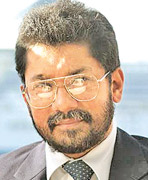Sri Lanka poised to exceed MDGs by 2015
Sri Lanka is well poised to meet and exceed the Millennium
Development Goals (MDGs) before 2015, said Executive Director Institute
of Policy Studies, Sri Lanka Dr. Saman Kelegama. He was addressing the
policy Dialogue ‘From Poverty to Sustainability-putting people at the
centre of Inclusive Development’ to mark the International Day for the
Eradication of Poverty.
|

Dr. Saman Kelegama |
Dr Kelegama said “Sri Lanka recently emerged as a lower middle income
country with its growth rate averaging over five percent in the past
decade, and rising to eight percent in 2010. At the same time Sri Lanka
has been successful in translating this growth into a reduction in the
poverty head count ratio from 15.2 percent in 2006/07 to 8.9 percent
according to available data.
Similarly impressive gains have been on social indicators such as
universal primary school enrolment, literacy rates and gender equality
in primary and secondary school enrolment. Therefore, Sri Lanka is well
poised to meet and possibly exceed the MDGs before 2015. “However,
challenges remain at regional level and among certain vulnerable groups.
Poverty data indicates a higher incidence in some of the districts in
the central regions of the country, including the plantation sector and
in the North and the East in terms of income and human development
indicators. These regional disparities were highlighted in the MDG
country report 2008/2009 that was produced by the IPS, UNDP Sri Lanka
and the Ministry of Finance and Planning last year” said Dr Kelegama.
UN Assistant Secretary General and UNDP Assistant Administrator and
Director for Regional Bureau for Asia and the Pacific Ajay Chhibber in
his message said that Sri Lanka is well known in the region as a country
that has made significant progress in reducing poverty and achieving
MDGs.
The early emphasis on universal and free access to education and
health Services and a consistent focus on the specific needs of the
rural poor have translated into a strong track record of human
development. Therefore in my opinion Sri Lanka has long served as a
model to other countries in the region”, said Chhibber in his message.
He said ‘the theme is relevant specially in the context of Asian
economies where many countries have sustained high rates of growth for
many years. First were East Asian tiger economies and now China and
India are changing the economic landscape of the region and the world.
In Sri Lanka impressive income growth despite the conflict enabled it to
attain Middle Income country status in 2010. But the challenge for Sri
Lanka and many other countries in the world today is for growth to
translate into reducing poverty for a much higher proportion of the
population. Today’s focus on inclusive development suggests that the
world is beginning to accept that growth in and of itself where the
benefits accrue to only a few is not good enough.
The theme is also relevant in the context of the upcoming Rio+20
conference to be held in Brazil in June 2012. We will look over the past
two decades to see what has been achieved in terms of sustainable
development.
The conference will also look at what challenges remain and what more
can be done to ensure a sustainable future for all people. He said that
though the world economic growth has decelerates in recent decades the
trend in Asia is the opposite with China and India becoming the engine
of regional growth. Many other Asian countries are also going above
global averages.
In Asia and the Pacific the number of poor people living on less than
$1.25 a day has declined from 1.7 b in 1981 to 933 min 2005.
SG
|

